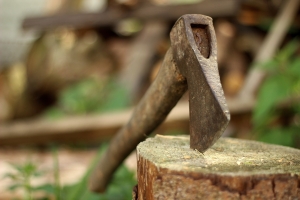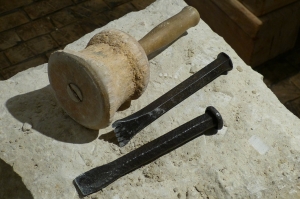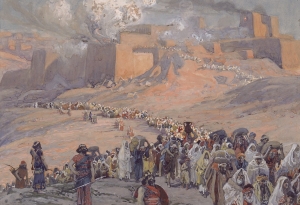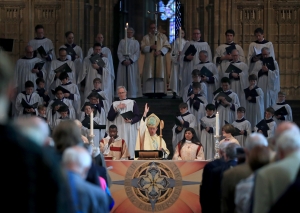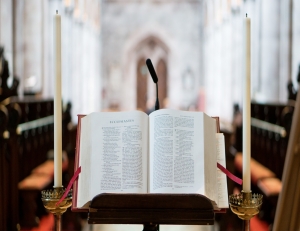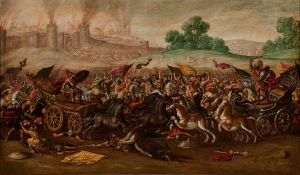General
Displaying items by tag: judgment
Studies in Jeremiah (42)
Studies in Jeremiah (41)
Trump and the Gift of Josiah
Studies in Jeremiah (40)
Studies in Jeremiah (30)
Deception in the house of God.
“Beware of your friends; do not trust your brothers. For every brother is a deceiver, and every friend a slanderer. Friend deceives friend, and no one speaks the truth. They have taught their tongues to lie; they weary themselves with sending. You live in the midst of deception; in their deceit they refuse to acknowledge me,” declares the Lord. (Jeremiah 9:4-6)
Jeremiah’s whole life was spent coping with opposition. From the time of his call to ministry, when he was probably still in his late teens, he was warned by God of the problems ahead: “They will fight against you but will not overcome you, for I am with you and will rescue you, declares the Lord” (Jer 1:19).
Cost of Faithfulness
He was born into a family of priests in the rural area of Anathoth and his family were regarded as much lower down the scale of public esteem than the priests who lived in Jerusalem and were responsible for the Temple.
To have a prophet as outspoken as Jeremiah in a family of priests was a tragedy! No doubt when they came into Jerusalem to take their turn of serving in the Temple, his brothers and other family members would have been greatly embarrassed to hear what the Temple priests were saying of their relative. But Jeremiah did not soften his words to please his family or to spare their discomfort; he declared the word of the Lord fearlessly.
But there was a cost and many times he feared for his own life – even on one occasion at the hands of his own brothers, who were plotting against him saying, “Let us cut him off from the land of the living, that his name be remembered no more.” Jeremiah describes himself as “like a gentle lamb led to the slaughter” (Jer 11:19). He says in today’s reading, “Do not trust your brothers. For every brother is a deceiver”. Probably he had been invited to some family gathering but God had warned him not to go by revealing their plot to deceive him.
Jeremiah did not soften his words to please his family or to spare their discomfort; he declared the word of the Lord fearlessly.
Idolatry in the Temple
Jeremiah’s main target was not the ordinary people, nor the political leaders – it was the religious leaders, the priests and prophets who were the great deceivers of the nation. They were the educated elite who were able to read the Hebrew scrolls and to know the teaching of the Lord that was given to Moses. There was no excuse for them. The ordinary people did not know the requirements of the Lord, but the priests and prophets had full access to the word of God. They were the arch-deceivers because they misused this power and authority: “The prophets prophesy lies, the priests rule by their own authority” (Jer 5:31).
As we have said before in this series, the most serious act of deception by the Royal Temple priesthood was that they perpetuated the myth of the Temple’s inviolability, saying that God would never allow any enemy to destroy it and therefore Jerusalem was safe from attack, because God would always defend the city. Jeremiah knew this to be a terrible lie because God is a God of righteousness who demands faithfulness and loyalty from his people.
Yet the people of Jerusalem were worshipping other gods – especially Astarte, the goddess of the Babylonians, who they thought might help them by keeping the Babylonians away from the land of Judah. Once again, it was not only the people who were practising idolatry; there were even secret altars to foreign gods in the Temple itself. “Prophets and priests alike, all practice deceit. They dress the wound of my people as though it were not serious. ‘Peace, Peace’, they say, when there is no peace” (Jer 6:13-4).
It was not only the people who were practising idolatry; there were even secret altars to foreign gods in the Temple itself.
Deceiving in God’s Name
God hates deception, especially in spiritual matters. When people declare something in the name of God that deceives others – that is particularly abhorrent! But that is what the prophets were doing in Jeremiah’s lifetime: “Do not listen to what the prophets are prophesying to you”, he said. “They fill you with false hopes. They speak visions from their own minds, not from the mouth of the Lord. They keep saying to those who despise me, ‘The Lord says you will have peace’” (Jer 23:16-17).
These were wicked lies and deception that would have disastrous consequences because the people did not change their ways. They carried on in idolatry and God eventually removed his cover of protection from over Jerusalem, allowing the Babylonians to destroy the city.
In Western nations today, we are surrounded by deception in the media, in politics and in the world of commerce and advertising. But the most dangerous deception by far is coming from the Church. When the word of God is not faithfully taught and prophetically declared by the religious leaders of a nation, God holds those leaders responsible for the fate of that nation.
This is a sobering biblical truth that ought to be constantly in the minds of church leaders today – even if it means they have to pay the price that Jeremiah had to pay.
This article is part of a series on the life and ministry of the Prophet Jeremiah. Click here to read previous instalments.
Studies in Jeremiah (27)
Jeremiah’s most devastating prophecy.
“At that time,” declares the Lord, “the bones of the kings and officials of Judah, the bones of the priests and prophets, and the bones of the people of Jerusalem will be removed from their graves.
They will be exposed to the sun and the moon and all the stars of the heavens, which they have loved and served and which they have followed and consulted and worshipped. They will not be gathered up or buried, but will be like refuse lying on the ground. Wherever I banish them, all the survivors of this evil nation will prefer death to life”, declares the Lord Almighty. (Jeremiah 8:1-3)
This is the most devastating piece of prose among all the prophecies of Jeremiah. Jeremiah’s prophecies are usually in poetic form; but this is different, and so too is its content. There are no conditions here, nothing suggesting that the prophesied disaster is conditional - that it may happen, unless there is repentance and turning. All the red lines have now been crossed. Judgement is inevitable.
The placing of this devastating statement at the conclusion of chapter 7 is highly significant. It needs to be read as the final word of that chapter, outlining the inevitable consequences of ignoring the warnings: “I will bring to an end the sounds of joy and gladness and to the voices of bride and bridegroom in the towns of Judah and the streets of Jerusalem, for the land will become desolate” (Jer 7:34).
“‘At that time’, declares the Lord…” describes in vivid language what is going to happen in the city of Jerusalem and the land of Judah because, “they will not listen to you!”
A Figment of Imagination?
The shocking rhetoric of this text has been dismissed by some biblical commentators such as Walter Brueggemann1 as ‘unrealistic imagination’ designed to shock the people of Judah, as a kind of last hope of change and redemption. Many commentators regard this outburst from Jeremiah as something that could not possibly have happened.
Sadly, recent archaeological evidence confirms that what Jeremiah foresaw was not a figment of his imagination, but an accurate revelation of what happened in Judah, and Jerusalem, in the year 586 BC. Research in the land of Israel shows that there was a sudden and devastating demographic fall in the population of Judah, in the city of Jerusalem and its surrounding area at that time.
Archaeology shows that what Jeremiah foresaw was not a figment of his imagination, but an accurate revelation of what happened in Judah, and Jerusalem, in 586 BC.
Some archaeologists say that the population of Judah suddenly fell from 108,000 to 40,000 inhabitants at that period through a combination of exile and destruction. 2 Kings 24:15-17 estimates that about 10,000 were taken to Babylon in the year 586 BC. Jeremiah says that 832 people from Jerusalem were taken that year, but he also records that a further 3,023 had been taken ten years earlier and another 745 were taken to Babylon in the year 581 BC (Jer 52:29-30). In addition to these exiles, we know that an unknown number went to Egypt after the assassination of Gedaliah, and that none of them, including Jeremiah, returned (see Jer 44:25-27).
Anthropologists studying the archaeological evidence for that period reckon that the fall in population across the land of Judah was around 80%, but in the city of Jerusalem and its environs, it appears to have been as much as 90% or even more.2
The devastation of the city and the towns and villages of Judah was similar to our modern ‘scorched earth’ policy, with unburied bodies left scattered across the countryside and open to the prey of wild animals and birds.
Terms of the Covenant
All this is to say that the scene described by Jeremiah in this passage was not a wild flight of his imagination, but an accurate forecast of what has now been discovered to have taken place in history. His description of people from all ranks of society being left exposed to the sun and the moon and the stars of heaven is a poignant reflection of the idolatry that had encompassed the nation, sweeping whole communities into pagan practices that had been roundly condemned by the prophets of Israel for centuries.
Jeremiah spent the whole of his adult life pleading and reasoning with the people of Judah and warning of the inevitable consequences of turning to other gods. He saw with horror what was happening in the nation in much the same way as Moses saw with horror the ‘golden calf’. Moses had been called by God to establish his covenant relationship with the people of Israel and warned them of the consequences of breaking that covenant (Deut 4:24-26).
Jeremiah was present when Josiah renewed the covenant (2 Kings 23). The king pledged loyalty to Yahweh after he had sent the scroll to the Prophet Huldah, asking whether or not it was a genuine word from God (2 Chron 34:22-28). Jeremiah expressed full agreement with the words of Huldah, “Tell them that this is what the Lord, the God of Israel, says: ‘cursed is the man who does not obey the terms of this covenant’” (Jer 11:3).
Jeremiah’s description of people being left exposed to the sun and moon and stars of heaven is a poignant reflection of the idolatry that had encompassed the nation.
From that time the ministry of Jeremiah was exclusively directed to warning the nation – the political and religious leaders as well as the ordinary people – about the consequences of breaking the covenant and putting the nation outside the covering protection of God. The brutal warning in this prophecy that concluded his message in chapter 7 accurately foresaw not only the desolation of the land and the slaughter of the population, but also the devastating effect upon the survivors who were taken into exile in Babylon, who preferred death to life. This is so poignantly depicted in Psalm 137: “By the rivers of Babylon we sat and wept when we remembered Zion. There on the poplars we hung our harps, for there our captors asked us for songs, our tormentors demanded songs of joy; they said, ‘Sing us one of the songs of Zion!’...” (Ps 137:1-3).
God’s Protection Removed
Can any Bible-believing Christian in Britain or the Western nations fail to tremble when we read the words of Jeremiah and those of the psalmist in Babylon? Historical facts confirm the prophetic words of Jeremiah 8:1-3: God removed his cover of protection from Jerusalem and the land of Judah, allowing the wrath of cruel humanity to do its worst.
In recent times we have seen history repeated in the central European Holocaust that murdered 6 million Jews. But in Israel today, as in all the nations of the West, the land is being polluted with the blood of the innocent, as babies are sacrificed on the altar of abortion clinics. Will God once again remove his cover of protection?
References
1 Jeremiah 1-25: To Pluck Up, To Tear Down. International Theological Commentary, Handsel Press, Edinburgh, 1988, p80.
2 Ahn, JJ and Middlemas, J, 2013. By the Irrigation Canals of Babylon: Approaches To The Study Of The Exile. T&T Clark, New York and London, p149.
This article is part of a series on the life and ministry of the Prophet Jeremiah. Read previous instalments here.


